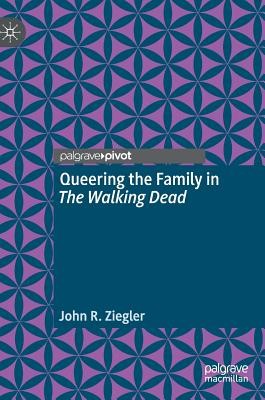
- We will send in 10–14 business days.
- Author: John R Ziegler
- Publisher: PALGRAVE PIVOT
- ISBN-10: 3319997971
- ISBN-13: 9783319997971
- Format: 14.8 x 21 x 1.3 cm, kieti viršeliai
- Language: English
- SAVE -10% with code: EXTRA
Reviews
Description
This book traces how The Walking Dead franchise narratively, visually, and rhetorically represents transgressions against heteronormativity and the nuclear family. The introduction argues that The Walking Dead reflects cultural anxiety over threats to the family. Chapter 1 examines the destructive competition created by heteronormativity, such as the conflict between Rick and Shane. Chapter 2 focuses on the actual or attempted participation of characters such as Carol and Negan in queer relationships. Chapter 3 interprets zombies as queer antagonists to heteronormativity, while Chapter 4 explores the incorporation of zombies into the lives of characters such as the Governor and the Whisperers. The conclusion asserts that The Walking Dead presents both queer alternatives to and damaging contradictions within the traditional heterosexual family model, helping to question this model and to consider the struggle of queer American families. Overall, this study holds special interest for students and scholars of queerness, zombies, and the family.
EXTRA 10 % discount with code: EXTRA
The promotion ends in 22d.01:53:11
The discount code is valid when purchasing from 10 €. Discounts do not stack.
- Author: John R Ziegler
- Publisher: PALGRAVE PIVOT
- ISBN-10: 3319997971
- ISBN-13: 9783319997971
- Format: 14.8 x 21 x 1.3 cm, kieti viršeliai
- Language: English English
This book traces how The Walking Dead franchise narratively, visually, and rhetorically represents transgressions against heteronormativity and the nuclear family. The introduction argues that The Walking Dead reflects cultural anxiety over threats to the family. Chapter 1 examines the destructive competition created by heteronormativity, such as the conflict between Rick and Shane. Chapter 2 focuses on the actual or attempted participation of characters such as Carol and Negan in queer relationships. Chapter 3 interprets zombies as queer antagonists to heteronormativity, while Chapter 4 explores the incorporation of zombies into the lives of characters such as the Governor and the Whisperers. The conclusion asserts that The Walking Dead presents both queer alternatives to and damaging contradictions within the traditional heterosexual family model, helping to question this model and to consider the struggle of queer American families. Overall, this study holds special interest for students and scholars of queerness, zombies, and the family.


Reviews